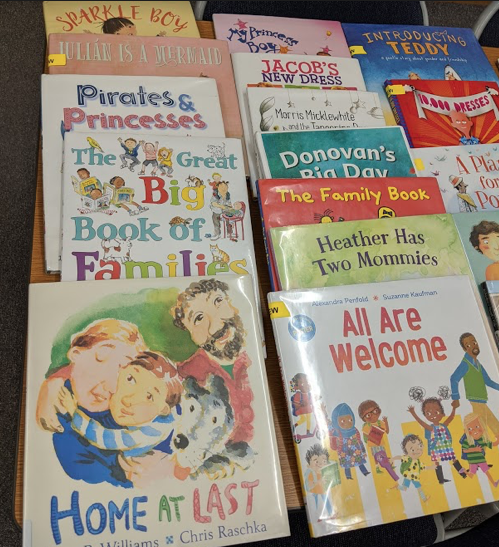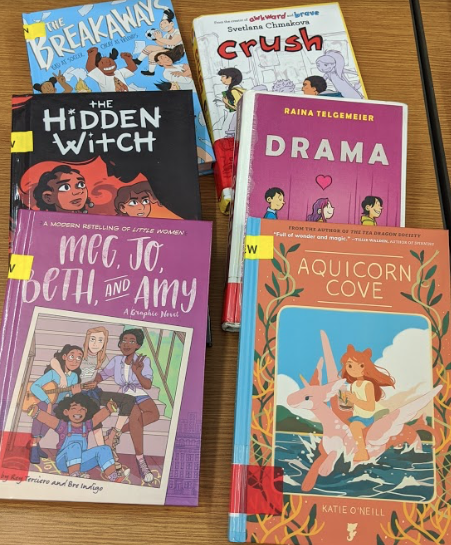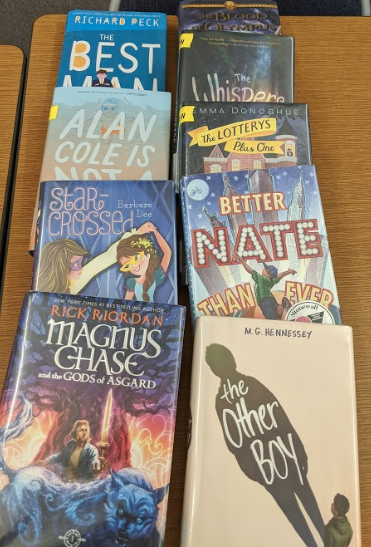a recipient of a 2019 MA Super Librarian Award.
I want to preface this by saying I am a straight cis white woman and am by no means an expert. I am doing my best to learn and am grateful to so many people who identify as LGBTQIA+ for their generosity in helping others support students.
Why do we need LGBTQIA+ representation in the elementary library?
With Dr. Rudine Sims Bishop being awarded the ALA 2020 Children’s Literature Lecture Award, the research which supports having resources in the school library which reflects all people has become much more well-known. The LGBTQIA+ community is severely underrepresented in all libraries but the argument could be made that it is most underrepresented at the elementary level.
However, I have heard some people comment that students in elementary school are too young to hear of LGBTQIA+ subjects. The MA Department of Elementary and Secondary Education disagrees. The Massachusetts History and Social Science Curriculum Framework adopted in 2018 explicitly mentions the teaching of such topics.
Guiding Principle 2
An effective history and social science education incorporates diverse perspectives and acknowledges that perceptions of events are affected by race, ethnicity, culture, religion, education, gender, gender identity, sexual orientation, disability, and personal experience (History 13).
Grade 1 Content Standards
Topic 3. History: unity and diversity in the United States [1.T3]
Supporting Question: What does the motto, “Out of Many, One” mean and why is it a good motto of the United States?
16. Provide evidence to explain some of the ways in which the people of the United States are unified (e.g., share a common national history) and diverse (e.g., have different backgrounds, hold different beliefs, and have different celebrations, cultural traditions, and family structures).
Clarification Statements:
- Students should learn about each other’s families and types of families that may be different from their own (e.g., single-parent, blended, grandparent-headed, foster, LGBT, multiracial). They should begin to develop an understanding of the diversity of the people of the United States and at the same time, how people of different backgrounds can still hold in common shared values of politeness, courage, honesty, respect, and reliability.
- Students should be able to conduct investigations about unity and diversity by reading/looking at picture books about families of diverse backgrounds or interviewing friends, family members, neighbors, or school staff, and then reporting their findings about what people from diverse backgrounds have contributed to the nation, the Commonwealth, or the local community (History 41).
Grade 5 Content Standards
Topic 5. Slavery, the legacy of the Civil War, and the struggle for civil rights for all [5.T5]
Supporting Question: What ideas and events of the 19th century led to the expansion of civil rights in the 20th and 21st centuries?
9. Explain how the 20th century African American Civil Rights movement served as a model for other movements for civil rights (e.g., the second phase of the women’s movement in the 1960s and 1970s, the disability rights movement, the LGBTQ movement).
Clarification Statement: These 20th century standards are designed to make students aware that the movement to extend equality to all has roots in 18th century ideas and is the reason the foundational documents are relevant to all periods of United States history. The links among liberty, justice, and equality remain central in the collective civic life of the nation today (History 78).
Feeling nervous?
Are you worried about teachers or administrators questioning the presence of LGBTQIA+ material in the library? Or do you want to be able to support teachers who are nervous about teaching these subjects and/or reading books with LGBTQIA+ representation?
Start at the top.
In Sudbury, our Mission & Vision statement includes, “Seek and promote opportunities to advance equity” and “Safe school environment” (Mission). If yours includes something similar, the Superintendent and/or Curriculum Director(s) should be supporting your efforts to be as inclusive as possible. If you think there could be any questions, be sure to go with research on Windows, Mirrors, and Sliding Glass Doors as well as the pertinent parts of the MA Curriculum Framework.
Next, work with the principal to explicitly ensure the teachers that they are supported in teaching to the standards and to being inclusive.
If you feel more needs to be done beyond even research and standards, encourage your administration to invite Safe Schools to speak to your staff. The Safe Schools Program for LGBTQ Students is a joint program of the Massachusetts Commission on LGBTQ Youth and the Massachusetts Department of Elementary and Secondary Education (DESE). It was founded in 1993 to address concerns of bullying and suicide risk that faced LGBTQ youth in Massachusetts public schools. Today, the Safe Schools Program remains an important part of implementing the state’s anti-bullying law and protecting the health and safety of students (Commonwealth).
We have had them speak to our entire staff twice in the past few years and it was really useful for all of our staff. The second presentation did not feel repetitive at all and was especially appreciated by new staff.
Find support!
Many librarians have no other librarians in their building and only a few in their district. It is easy to feel like you’re on your own most of the time. Therefore it’s imperative to cultivate support from other sources. Find allies.
- Feel free to email me at any time and I will be happy to listen.
- The MSLA Annual Conference is a resource where you can learn more as well as meet allies.
- Take courses. I took one from Learner’s Edge (Thrive! Supporting LGBTQ Students in School) in which I learned so much and found so many resources. I’m sure there are others around, so find one that suits your particular needs.
- Connect with the GSAs in your middle and/or high schools. Mine was very happy to help me.
Conclusion
We all have students who now or will in the future deserve to see themselves represented in our libraries. All students should be learning of the wonderfully diverse population that make up our communities. No student or family should feel uncomfortable just being who they are.
Addressing the existence of LGBTQIA+ people and issues needs to happen at all school levels. There are same-gender parents in all of our schools. We have non-gender typical students. We have students who are gay. We have students who are transgender. Do they all feel comfortable and safe enough to not feel they have to hide who they are? Are we educating all our students so our schools are as richly and wonderfully diverse as they should be?
LGBTQIA+ Books in the Noyes Library
Commonwealth of Massachusetts. "Safe Schools Program for LGBTQ Students." Mass.gov, 2020, www.mass.gov/info-details/ safe-schools-program-for-lgbtq-students. Accessed 1 Feb. 2020.
History and Social Science Framework. Massachusetts Department of Elementary and Secondary Education, 2018. Massachusetts Department of Elementary and Secondary Education, www.doe.mass.edu/frameworks/hss/2018-12.pdf. Accessed 1 Feb. 2020.
"Mission & Vision." Sudbury Public Schools, www.sudbury.k12.ma.us/domain/64. Accessed 1 Feb. 2020.




